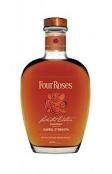A review of the Ramot Naftaly Barbera 2007 and the Four Roses Limited Edition Small Batch Bourbon for 2012.
By Joshua E. London and Lou Marmon
Washington Jewish Week October 15, 2012

This chasidic shul, Congregation Toldos Yakov Yosef Skver, was raided in 2009 by the organized-crime unit of the Quebec Police Department. Le Fuzz confiscated nearly 900 liters of kosher wines and spirits including banana liquor and peach schnapps. Several members of the shul and the congregation itself were charged with importing and distributing kosher wines that had not been obtained through the province’s alcohol regulatory commission, Societe des Alcools de Quebec (SAQ).
What could possibly induce a small congregation to risk running afoul of Quebec’s legal system by selling kosher wines from their basement? According to journalist David Sugarman’s article in Tablet magazine:
“The synagogues, he explained, bring the wine in from Ontario. By doing so, they avoid Quebec taxes and utilize an Ontario law that makes wine used for religious purposes 17 percent cheaper than market price. The illegal wine shops serve a number of purposes; they make money for the synagogues and offer a selection that is far superior to that of the SAQ stores … the bootlegging is not only about profit, but also about the needs of the community; observant Jews in Montreal … have repeatedly asked the SAQ to get a better kosher selection. The SAQ constantly says it will but never actually does.”
So the lack of decent selection was the primary motivation. We can relate.
Not surprisingly the Quebec authorities were not pleased with this circumvention of their regulations and taxes. But it all ended up quietly. By paying the fine the shul did not have to appear in court and the civil government avoided a potential conflict over an aspect of religious freedom in Canada.
Thus it appears that the increasing quality and variety of kosher wines is a blessing to those with access and a curse to those who are merely teased with the knowledge of what lies in unavailable bottles. In the U.S., kosher wine is also subject to governmental regulations and is dependent upon the stock lists of importers and distributors. The Royal Wine Company, and several other smaller kosher wine importers and distributors, are steadily expanding the available choices but many kosher winemakers in Israel and elsewhere are still seeking a foothold in the U.S. marketplace.
Among these is the Ramot Naftaly Winery located in the Kedesh Valley of the Upper Galilee. Yitzhak Cohen, owner of the winery, was actually the first to plant the Barbera grape in Israel. A small operation with less than five acres of vines, the winery has been gaining in both popularity and critical acclaim. An example is its medium-bodied Ramot Naftaly Barbera 2007 that is rich with spicy cherry and red berry scents that flow into blackberry and dark cherry flavors accented with vanilla and pepper. It’s a great wine to match with pizza, burgers and lamb. To be enjoyed in Israel or brought back – in accordance with federal guidelines; we do not recommend bootlegging, even in the name of “choice.” We certainly hope that those wines will appear on our shores, and in our neighborhood, soon.
Spirits-wise, we thought we’d give a nod and wink to American sensibilities and belatedly recognize that last month was “National Bourbon Heritage Month.” Back in August 2007 the United States Senate, having nothing more important or pressing to be getting on with, passed S.Res. 294, “A resolution designating September 2007 as ‘National Bourbon Heritage Month.’ ” The resolution calls for consumers who enjoy bourbon to do so responsibly and in moderation, which, in hindsight, is a lot more useful than all sorts of things the Senate might otherwise have done. Why September? Why not! Besides, since 1992, Bardstown, Ky., has hosted the weeklong “Kentucky Bourbon Festival” every September, so there seemed no reason to complicate the calendar. So now every September is “National Bourbon Heritage Month.”
Another great recent annual tradition associated with the Kentucky Bourbon Festival is the announced release (since 2010) of the annual Four Roses Limited Edition Small Batch Bourbon. This year Jim Rutledge, master distiller at the Four Roses Distillery, selected four bourbons from among its 10 distinct bourbon recipes to be married together and bottled as the 2012 release. The four Bourbons, between 11 and 17 years old, were blended and bottled together at barrel strength.
Four Roses Limited Edition Small Batch for 2012 (Tasted at 57.5 percent ABV, but will vary; $100): This is a great bourbon with a nose full of vanilla, burnt orange peel, mild allspice, nutmeg and pipe tobacco, with traces of leather, and spicy and tart flavors of vanilla, orange peel, black pepper that fades into fresh dark berries, caramel and subtle dark chocolate. The finish is clean, warming and mellow, with vanilla, cedar wood, and mocha. L’Chaim.
